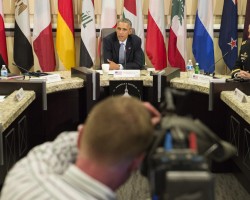
Talking through Obama’s AUMF Proposal | Tobias Gibson
Talking through Obama’s AUMF Proposal
Tobias T. Gibson
February 20, 2015 | The
Hill
Last week, the Obama administration sent Congress a draft proposal for a new Authorization of Military Force (AUMF) specifically targeted at the threat of the Islamic State in Iraq and Syria (ISIS). Predictably, the reaction was swift. Equally predictably, the feelings toward the proposal were largely divided along partisan lines. There is one commonality, however — feelings that the draft AUMF is not perfect.
Responses were swift by those outside of government, as well. My colleagues at National Security Network (NSN) offered ”the good, the bad and the ugly” of the proposed AUMF. Among the “good,” seconding Pelosi, is the end to the 2002 Iraq AUMF.
There are more two contested “good” outcomes stemming from the proposed ISIS AUMF.First, NSN contends that three-year expiration date “is important to make sure the conflict is reassessed in the future and to prevent the next president from dramatically changing war policy without congressional approval.” However, this provision is part of the concern expressed, primarily by conservative members of Congress and other critics, that the AUMF may inadvertently hamstring the president — or the president’s successor — in the struggle to “degrade, and ultimately destroy” ISIS. However, in a report issued in August of last year, it was revealed that nearly a quarter of previous military authorizations included expiration dates. Thus, it is unlikely that President Obama’s request will undermine the legitimacy of the commander-in-chief powers.
Gibson is an associate professor of political science at Westminster College in Missouri and a National Security Network (NSN) Fellow. The views expressed here are not necessarily the views of NSN.
To continue reading, click here.




![Jeb Bush speaks at the 2013 Conservative Political Action Conference [Photo by Gage Skidmore, 3/15/2013]](/cms/assets/uploads/2015/02/Jeb-Bush-II-e1426010666313-140x140.jpg)